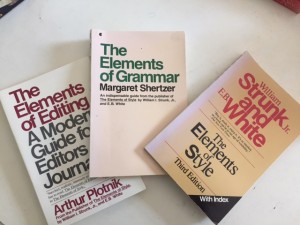This post is very late. I was in a super bad mood last Sunday and couldn’t think of anything I wanted to write, and I was too busy reading contest entries anyway.
Back in the spring I volunteered to serve as a first round judge in several contests. I actually love judging contests, but when I volunteered I stupidly failed to realize that all of the entries were due back in the same week. Nevertheless, I was happy to do it–it is great fun to read the entries and to help a writer (often a brand-new writer) learn a bit more about craft, and I never fail to learn something myself. Sometimes the entries are absolutely wonderful and truly a joy to read. Other times, not so much. This year, I had far more not-so-much entries than wonderful ones. Most of the entries I read had a great plot–original, interesting, and fun. Unfortunately, many of them were also riddled with errors in grammar and punctuation. Some had clearly not even been proofread, and were full of typographical errors and spelling mistakes.
As a result of this experience, I have spent the last few days wondering why writers would enter a contest without dealing with at least some of these problems. It is important to realize that a contest is, in some ways, a trial query. Most contests have agents and/or editors serving as final round judges. If you final, you get your work in front of one of them. If she likes it, she may request a partial manuscript, or even a full. And sometimes–as I can gratefully attest–an editor buys your book or an agent agrees to represent you. Why, then, would you not make your manuscript the very best it can be before submitting it? Especially because contests cost money?
Now, I will admit that the first time I entered a contest I had no idea what I was doing, and it is certainly possible that some of the writers I judged were in a similar place in their writing careers. My entry had many, many craft errors, but it had been carefully proofread. I learned a lot from the judges in that contest, and in my critiques of the entries I reviewed in the last couple of weeks, I tried to do the same for those writers.
My point here is two-fold: First, if you are an author, especially a published author, consider donating your time and expertise to ju dge a contest. You will make a huge difference in a writer’s life, and you will learn something too.
dge a contest. You will make a huge difference in a writer’s life, and you will learn something too.
Second, if you are a writer wishing to enter a contest, polish that manuscript! Proofread it–do not rely on spell check alone. Check your grammar. If you need to brush up on grammar rules, do so. Pick up a copy of Strunk and White. Go online–there are a lot of sites which offer help on grammar issues. For example, I like the Grammar Girl for short and sweet tips. There’s Grammarly, which scans your text for grammar and punctuation. (I’ve never used it, but it gets good reviews.) From the Write Angle has blog posts about grammar, craft, querying, and a bunch of other good stuff. Or just Google “grammar” and see what you get. Once you have these basics down, it’s much easier to focus on the craft–all those things that make you a better writer.
I’ve decided to stop whining and do something to help (hopefully). Once a month, starting next week, I’ll do a post on issues I’ve spotted in manuscripts, or things I’ve been curious about. If any of you have a grammar or craft question you’d like me to discuss, or if you’re interested in doing a guest post about your grammar pet peeve, or if you are better than I am at coming up with catchy names for my grammar posts (because honestly, who isn’t better at that than I am?), leave a comment here or drop me a line at marinmcginnis@yahoo.com.
